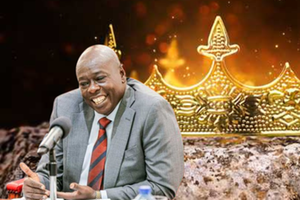Need to chart the future of education in dynamic world

Kabete National Polytechnic student Billy Mutua displays a robot during the National Assembly Education and Research Committee members' tour of the Robotics and Innovation Centre at the institution on December 5, 2023.
As over 3,000 principals from across the globe gather in Mombasa from August 19-23 for the 2024 edition of the International Confederation of Principals (ICP) World Convention, it is clear that we stand at an inflection point; at the cusp of a new era in education.
The pathways to learning are evolving rapidly, driven by technological advancements, mutating societal needs and a growing emphasis on lifelong learning. In a radical departure from the past, the future of learning and learners promises to be more dynamic, personalised and inclusive and, therefore, reshaping how we impart knowledge and skills to learners.
The one-size-fits-all approach to education is becoming moribund and obsolete. The future of learning environment is one which is characterised by personalisation in order to identify, develop and nurture individual flairs and competencies.
In order to actualise learning pathways, educators have a herculean responsibility to tailor educational experiences to individual learner needs and aptitudes. Suffice it to say that today’s educator is akin to a tailor making an individual bespoke suit. We are, therefore, being called upon to hone our skills to customise learning pathways by offering learning experiences and support that match learners’ unique profiles.
Technology will continue to play a central role in shaping the future of education. Virtual learning and incorporation of ICT are set to transform the traditional classroom setting, providing immersive experiences that enhance learning.
In a split second, technology can transport students to a historical event or distant planets, offering experiential learning that a traditional classroom teacher or textbooks alone cannot provide.
In a rapidly changing job market, the concept of education as a one-time event is becoming outdated. The future will see an emphasis on lifelong learning, with individuals continuously acquiring new skills and knowledge throughout their careers.
This will be a paradigm shift from a culture where learning is a continuous journey rather than a series of graduation points.
It is also true that the future of learning will be more collaborative and globally connected. This Interconnectedness will foster cross-cultural understanding and prepare learners for a globalised workforce.
The upcoming ICP world convention of principals provides a platform to mull over and reflect upon some of the above issues with a view to coming up with sustainable strategies to navigate new frontiers in education across the globe.
To the Kenyan secondary school principals, this will accord a rare opportunity to interact with experienced practitioners drawn from across the globe in an ever-deepening conversation about gingering up our professional development in order to surmount new challenges in the education sector.
It is also an opportunity for school principals and other educational stakeholders to network with professionals and peers which provides new perspectives, collaboration opportunities and potential career connections.
In the face of the prevailing changes worldwide, education remains a cornerstone of personal and societal development. As we navigate the evolving landscape, it is crucial to foster a culture of reaching out to others, because the future of education hinges on our ability to forge and embrace partnerships whose collective ideas will pave way for a brighter, more informed generation.
Mr Kuria is the National Chairman of Kenya Secondary Schools Heads Association (KESSHA) and also the Chief Principal of Murang’a High School. [email protected]





